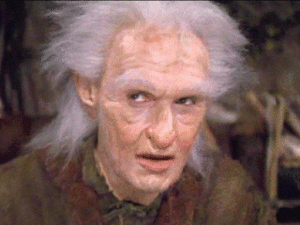Human Nature 2: The Greatest Battle Lies Within
 We love to hate bad guys. Some more than others. Especially Nazis. Very likely Nazis are the most-used standby bad guys. They feature prominently in nonfiction and fiction fields: from political rhetoric comparisons and Christian social-action documentaries, to action-hero movie plots and spy-thriller novels. Meanwhile, it seems stories about other villains like to attempt being more clever than that, by making the enemy Someone You Didn’t Expect:
We love to hate bad guys. Some more than others. Especially Nazis. Very likely Nazis are the most-used standby bad guys. They feature prominently in nonfiction and fiction fields: from political rhetoric comparisons and Christian social-action documentaries, to action-hero movie plots and spy-thriller novels. Meanwhile, it seems stories about other villains like to attempt being more clever than that, by making the enemy Someone You Didn’t Expect:
- In X-Men: First Class, apparently, it’s not the Russians or the Americans in the Bay of Pigs (Cuba) standoff who are the bad guys. Russians really, really wish they were not involved. So Communists aren’t bad guys. Bad mutants are the real bad guys.
- For many movie versions of legends or books, authors or scriptwriters like to season the original meals with popular flavors of political correctness. Ergo, Arab terrorists originally featured in the Tom Clancy thriller The Sum of All Fears got changed into (guess who!) neo-Nazis, for the 2002 film version. Similarly, in the BBC series Robin Hood, Muslims want peace in the Holy Land just as much as Robin Hood does; it’s the Crusaders, the Sheriff of Nottingham, and Prince John, who are the real enemies.
- In How to Train Your Dragon, as mentioned last week, the dragons aren’t the bad guys. (Spoiler.) A huge kingpin dragon is. So love the little dragons. Kill the big one.
I’m not calling for everything to be predictable. Some readers do seem to prefer stories that way: give me good guys and bad guys, with easy differences, and don’t let’s have any of this messy “gray area” stuff. Scripture won’t permit that, not because we are all “neutral,” but because we all have mixed motives in varying degrees, good and evil.
Instead, a lot of these bait-and-switch strategies themselves miss the chief of all villains, and one of the most rarely used surprise,-here’s-the-real-enemy plot twists. In effect they claim the worst enemy may be an external person, place, or Thing, but never the human heart.
- “You’re a good person, Harry,” assures Sirius Black in Harry Potter and the Order of the Phoenix (the film), before adding that bad things have happened to Harry (which the series later actually proves untrue, because Harry does have evil within him).
- “Look inside yourself, Simba,” intones Mufasa in the clouds, from The Lion King. “You are more than what you have become.” Ultimately that is all Mufasa can offer, despite Simba’s yearnings to receive help from his departed father: my son, you don’t need me; you already have what you need inside yourself.
-
In The Chronicles of Narnia: The Voyage of the Dawn Treader film (2010), the story swerves wildly off-course from the original book’s emphasis on a quest that is partly to find seven lost men, but mainly “not to seek things useful, but to seek honor and adventure,” according to the knight-mouse Reepicheep. And seeking Aslan’s Country, the mythical paradise beyond the world’s end, is worth all battles, quests, and dying, the noble mouse adds. In response, the movie director said he thought the book gave “no real reason for the journey,” and the film swapped longing for Aslan’s Country for self-esteem nonsense and only fighting External places and enemies — namely, an Evil Green Mist™. That’s not only rejecting the book; it’s just a lame story.
All these are from movies. Perhaps movies do this more than books, which have more time to develop characters and themes, complex ones, that more closely match reality. But the “you basically good, all enemies External” theme is easier to package and present in a movie.
But I cite these examples not to pick on these stories or to say they are all corrupted. I only need to prove this theme recurs too often. It’s constant. No matter who the enemy is, he’s always an evil far greater than the wickedness you have inside you. No surprises, no clever twists of the trope — the external enemy cliché rarely varies.
This is a reflection of people’s nonfiction worldview. Do they believe man is basically good or “neutral,” or basically evil? If good/neutral, then a story’s enemy is only External. If bad, then (so the logic goes) we can’t identify with a hero. Why? Because we’re basically good.
For internal use only
 These assumptions make for uniform stories and themes, without challenge, creativity or honest reflection on human nature. This could be done even by those who aren’t Christians, and even in stories that aren’t that good. After all, even the much-maligned movie Spider-Man 3 (2007) did this by showing the effects of an evil alien black ooze on the otherwise wholesome Peter Parker. The parasitic ooze did not impute evil onto Peter. It only amplified or magnified whatever the host already had. (A similar concept was in Green Lantern.)
These assumptions make for uniform stories and themes, without challenge, creativity or honest reflection on human nature. This could be done even by those who aren’t Christians, and even in stories that aren’t that good. After all, even the much-maligned movie Spider-Man 3 (2007) did this by showing the effects of an evil alien black ooze on the otherwise wholesome Peter Parker. The parasitic ooze did not impute evil onto Peter. It only amplified or magnified whatever the host already had. (A similar concept was in Green Lantern.)
If you prefer examples from more-loved stories, this may be why The Dark Knight and other “gritty” stories have gained popularity (and unfortunately also imitators that copy the whats without the whys). But whether “gritty” or not, the best stories match or complement the external conflict or enemy with the hero’s inner battle. Consciously or not, they dare to refute the usual “you’re a good person” lines and explore who we really are: humans, with good and bad desires, who — in the best stories — ultimately do make right choices.
So I don’t believe assumptions that only complex stories can handle this, or that if we show human nature as a mixture of good and evil impulses, we can’t identify with a hero. In fact, if we are honest with ourselves, we know that we feel contrasting desires; even non-Christians can admit this. Thus we find the best stories also illustrate this struggle. Some even do this while chirping out the usual “follow your dreams” and “look within yourself” mantras — in those stories, what we’re told is not what we see! So the dialogue might as well go ahead and match what’s clear to everyone else: Hero X is not basically good deep inside. He’s a human.
The rebel flesh
What about for Christians? Scripture gives us even more reasons to suspect human nature.
Yes, we do read about two other sets of villains in Scripture — the Devil (Genesis 2, Job, and the New Testament) and his spiritual forces whom we fight (Ephesians 6), and the world (that is, our present evil age; such as in James 4:4). But the Bible’s overall emphasis is on fallen human nature. In Genesis 2, the serpent is not even named as the Devil — we guess that from later references. Scripture’s epic story begins with the enemy being, not Something Else, but ourselves. Later we are also told that Christ came to destroy the works of the Devil (1 John 3:8), just as His death accomplished many other goals. Yet the overwhelming thrust of Scripture’s story and theology is that He died to resurrect people from spiritual death — the otherwise inevitable state of our rebel human flesh (Ephesians 1-2). He saved us, not just from the Devil and his demons, or our world’s evil present age, but from ourselves.
How might our stories reflect this concept? Do they now? Next week: A savior isn’t enough.











































I think generally you need a likeable main character; one out of your main cast needs to be a role model. It’s more realistic if everyone struggles, but on the other hand, it gets complicated when everyone on screen is battling inner demons and not the external forces which must needs be knocking down the door. (I’ve done a bit of writing in the past where I dealt primarily with inner struggle versus external and it was rather dry and didactic.)
But this is why I like stories like Doctor Who. You get the best of both worlds. Flawed, very flawed main character; but likeable because he’s so human and really is trying to do the right thing. Side characters who generally are good and likeable. External enemies who sometimes attack internally. Occasional episodes where the Doctor’s flaws put everyone in danger.
Another literary technique that works well with this is the foil character: like Gandalf and Saruman. Show the audience what could be, while never doubting the good/evil alignment of the character.
Just thinking out loud here. 🙂
The Doctor was my first thought too. Especially considering how dark he’s become over the past season…one of the best examples of ‘enemy within’–and an amazing plot twist–was in The Pandorica Opens. The Doctor describes the inhabitant of the Pandorica as follows
There was a goblin, or a trickster, or a warrior… A nameless, terrible thing, soaked in the blood of a billion galaxies. The most feared being in all the cosmos. And nothing could stop it, or hold it, or reason with it. One day it would just drop out of the sky and tear down your world
And with minutes to go, we find out what the inhabitant is
“The Pandorica is ready!”
Doctor: Ready for what?
SPOILER: ready for you SPOILER
And that’s not to mention his over-the-top showmanship in A Good Man Goes to War, or Ten’s Time Lord Victorious moment in Waters of Mars….even the Dream Lord in Amy’s choice drives home the ‘enemy within’ theme.
The Dream Lord was a lot of what I was thinking of. And the fact that the Doctor hurts people without meaning to, all the time. (SPOILER which is why he dropped off Amy and Rory SPOILER) And in the Runaway Bride, when Donna points out why he needs a human companion. Et cetera.
Pretty much the overarching story of the entire series: the Doctor has always tried to do the right thing, and he’s always finding that it’s (1) harder (2) costs and (3) he’s not perfect.
For “secular” stories: if they will show a character’s inner struggles (either gritty or not), don’t go trying to persuade me that this character is Basically Good and Only Bad Things Happen to Him/Her. I know what I see, both in myself, and in the story. That’s why it’s so strange that many stories will both forsake improved tension and enhanced audience appeal by clinging so desperately to humanism mantras: You’re Basically a Good Person.
But what’s even more confusing is when Christian stories do this … ah well, next week.
At present, though, it would be fascinating to hear whether you believe most Christian fiction, if it explores such issues, keeps our sinful nature in view, or else minimizes the greatest battle lying within in favor of emphasizing our battles against The World or Satan.
See, I’m not so sure on that. Some secular stories seem to deal with the idea that characters do have a ‘dark side’ and not in the dualistic Force kind of way. You don’t have to sit down and have a discussion of fallen human nature to understand this. Yes, the Doctor is a good person. Yes, the Doctor is a bad person. Both at once. He’s a person who makes choices, every day. Some of those choices are good and some of them are bad.
Ditto for Christian stories. I’m not sure, though, why in a lot of them just because a character is saved and secure, they never make bad choices. Bad stuff happens to them, but they don’t make bad choices. There’s not that kind of struggle that I see in (going back to previous example) the Doctor.
I’m becoming more hesitant to label a character as good or bad. People too. Because it’s not so simple. You are saved or lost, not good or bad. Good or bad is more of a description of the choices that you make. Saved people make bad choices; lost people make good choices. The world isn’t so simple as to assume that it’s always going to be saved-good-lost-bad.
Excuse me while I quote you:
And done. 0=)
I quite agree, Jenni, based not only on what I see, but on Scripture. It says both:
… And …
Not to mention the frequency of Scripture’s urges for God’s people to fight their own sin-shrapnel, and Paul’s lament about his own continuing struggles in this (Rom. 7).
Evil people can do bad things. And redeemed people, while “good,” can do evil.
I suppose that if God can present us both truths simultaneously, I can wrap my head around it!
Thus my statement that humans are not “basically good” or neutral, as too many stories (even Christian ones) seem to imply. If we hate God, we are at heart evil; if we are saved by Him and love Him, we are at heart declared righteous, and becoming holy, but still combat our sin-shrapnel. And even the secular stories that show this — whether they show a character given over to evil (like the Joker) or a flawed hero who ultimately makes good choices (like Bruce Wayne/Batman), they are “incarnating” in condensed story-form truths about our world.
As a Christian, I easily admit that even non-Christian people can do good things, and if we “suspend disbelief” long enough to picture a world in which God/Christianity are not factors, then flawed, “non-Christian” heroes become in a sense avatars of the redeemed individual, the human beings we are meant to be. They are not perfect Christ-figures, I suggest, similar to how we are not; rather, they are portrayals of how Christians as Christ-figures should act, and in a sense Christ-figure-figures.
That was one of the discussions that came up when they were making the Lord of the Rings: do you believe that you have corruption inside of you, and there is also an external force in the world attempting to corrupt you? (Like the Ring.) They interviewed all the cast with this question, and apparently they had been debating it while filming it. Some believed both, some believed only in the external, some believed only in the internal. (The making of LOTR is win and awesome.)
I love flawed characters who wrestle with evil desires. In my fanfiction days, I took one of the series’s characters and made him half robot. The robot half has had a bad copy of his living personality programmed into it’s AI, originally intended to make his robot and living minds work in harmony. But the AI went very, very bad, and struggled to master the living brain, even as the character’s living side struggled to master the robot. So this character is forced to do bad things sometimes because the robot has taken control. But the people around him don’t always believe that it was the robot–they think it was just that the split character is entirely evil. And the reader is left to decide if they are right.
Thanks for your analysis, and the reminder.
This is certainly an insightful article, but I disagree very slightly on one point. Although it’s definitely true that modern entertainment wrongfully ignores sin and human depravity and incompetence, I believe there is a place for a protagonist that truly is “basically good” within the context of the story.
One of the main reasons for enjoying speculative fiction (especially fantasy) is that we can see the authors’ vision of the pure ideals that we long for but that we never see in uncorrupted form in this fallen world. I think a genuinely good hero who is justified in his or her sufferings is a fundamental part of fiction in general. We know that we are weak and evil (even if we deny it), and we want to see someone overcome. As Christians, we know the Story where the One Hero prevailed against all evil.
Thus, stories with basically good protagonists echo redemption. Never perfectly, of course — no one can write a truly accurate Christ figure, because everyone who would try to write such a character is too flawed and blind to do so. Fiction with a morally-upright hero who echoes the True Hero will always be imperfect, but so is everything we do, even our Christian worship and fellowship. Again, one of the reasons we need speculative fiction in the first place is because we must believe in the perfection that we do not see.
I’m not trying to say that all protagonists should be basically good, either. Mr. Burnett described good uses of a flawed hero in the article. When the protagonist is flawed and struggling with his human nature, he is an Everyman figure seeking his own redemption. When the protagonist is a genuinely good person on a righteous mission, he is a Christ figure seeking to conquer and end all evil. And neither the Everyman figure nor the Christ figure will be perfect in fiction, because all authors and artists are imperfect.
Those are just my thoughts on the issue. 🙂
Thanks for your thoughts, Paul; they helped me heat some of my mental leftovers!
Fully agreed here — because it is true that Christians are, post-redemption, basically good, who do bad things because of that heart sin-shrapnel, or the Devil, or the world. Stories should echo that also, and not have only “gritty” heroes.
This is why I liked the recent Captain America movie so much, because it dared to go against the “gritty hero” who is gritty just for grittyness’ sake (if that’s a word).
The truth that some stories, especially those with strong Christian characters, should echo this truth as well, might lead to a fourth and new final installment of this series: perhaps Human nature 4: Saved for good works, or something like that.